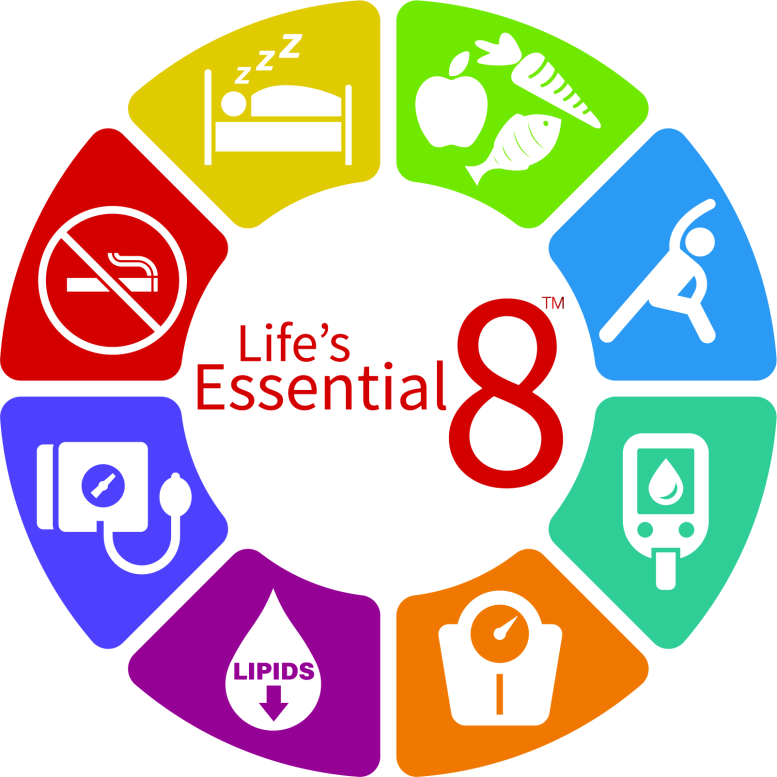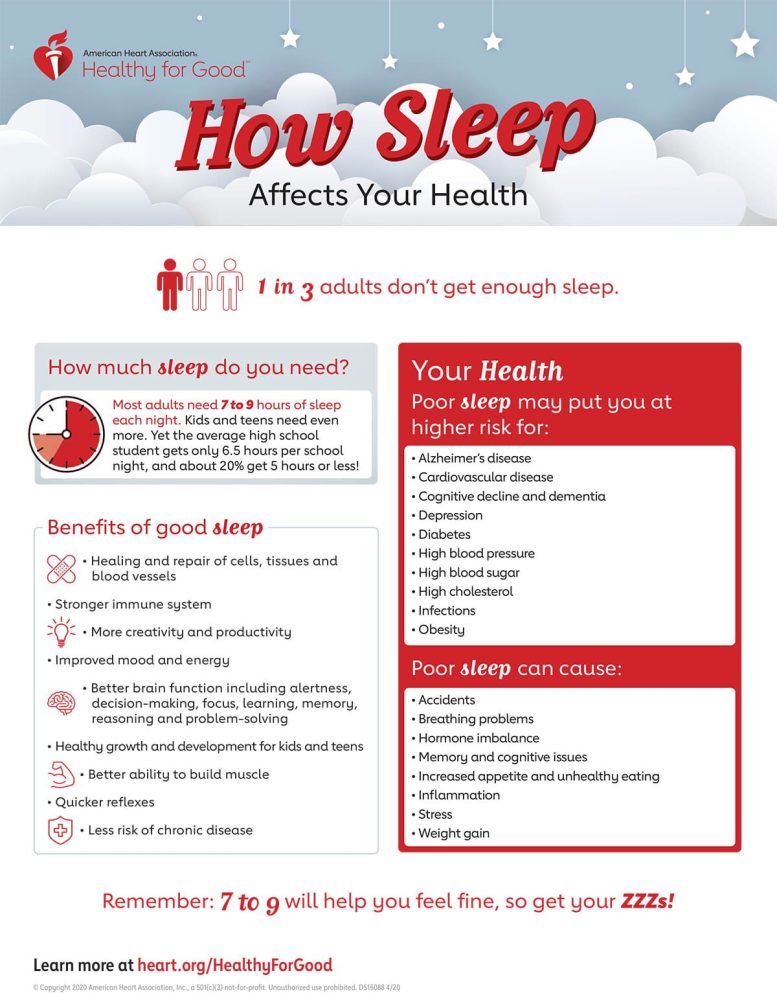
American Heart Association has added healthy sleep as essential for optimal cardiovascular health.
American Heart Association adds sleep to cardiovascular health checklist.
- The American Heart Association has updated its checklist to measure cardiovascular health. It is now called Life’s Essential 8™ and adds healthy sleep as essential for optimal cardiovascular health.
- Other health and lifestyle factors in the checklist, which were part of the previous, 7-item scoring tool, are physical activity, weight, nicotine exposure, diet, cholesterol, blood glucose, and blood pressure.
- The new sleep metric suggests that 7-9 hours of sleep daily is optimal for cardiovascular health for adults, and more for children depending on age.
- The updated scoring can now be used for people ages 2 and older, and four components are measured in new ways: a new guide to assessing diet; nicotine exposure replaces cigarette smoking to include electronic cigarettes (vaping) and exposure to secondhand smoke; non-HDL cholesterol is suggested instead of total cholesterol; and the blood sugar measure is expanded to include hemoglobin A1c levels.
- Life’s Essential 8™ is assessed by the online My Life Check tool, which has an updated scoring system to give users a score of up to 100 points based on an average of scores for each health and lifestyle factor.

The American Heart Association’s Life’s Essential 8™ image is a wheel shape with 8 wedges representing the 8 elements that are essential for cardiovascular health. Credit: Copyright American Heart Association 2022
Sleep duration is now considered an essential component for ideal heart and brain health. Life’s Essential 8™ cardiovascular health score replaces Life’s Simple 7™, according to a new Presidential Advisory, Life’s Essential 8—Updating and Enhancing the American Heart Association’s Construct on Cardiovascular Health, published today (June 29, 2022) in Circulation, the Association’s flagship, peer-reviewed journal.
Other updates to the measures of optimal cardiovascular health, now for anyone ages 2 and older, include a new guide to assess diet; accounting for exposure to secondhand smoke and vaping; using non-HDL cholesterol instead of total cholesterol to measure blood lipids; and expanding the blood sugar measure to include hemoglobin A1c, a key measure to assess Type 2 diabetes risk.
Cardiovascular disease is the number one cause of death in the U.S. and globally. According to the Association’s 2022 Heart Disease and Stroke Statistics Update, approximately 121.5 million people in the U.S. have high blood pressure, 100 million have obesity, more than 28 million people have Type 2 diabetes, and only 1 in 4 adults reported achieving the physical activity and exercise recommended in the U.S. Department of Health and Human Services’ Physical Activity Guidelines for Americans, 2nd edition. Various research studies over the past two decades indicate more than 80% of all cardiovascular events may be prevented by healthy lifestyle and management of known cardiovascular risk factors.
“The new metric of sleep duration reflects the latest research findings: sleep impacts overall health, and people who have healthier sleep patterns manage health factors such as weight, blood pressure or risk for Type 2 diabetes more effectively,” said American Heart Association President Donald M. Lloyd-Jones, M.D., Sc.M., FAHA, who led the advisory writing group and is chair of the department of preventive medicine, the Eileen M. Foell Professor of Heart Research and professor of preventive medicine, medicine and pediatrics at Northwestern University’s Feinberg School of Medicine in Chicago. “In addition, advances in ways to measure sleep, such as with wearable devices, now offer people the ability to reliably and routinely monitor their sleep habits at home.”
The Association first defined the 7 metrics for cardiovascular health in 2010 to identify the specific health behaviors and health factors that drive optimal heart and brain health. Brain health in relation to cardiovascular health was defined in a 2017 American Heart Association Presidential Advisory. It was further acknowledged as an important component of optimal cardiovascular health in the Association’s January 2021 Scientific Statement on the mind-heart-body connection. Findings from both papers are incorporated into Life’s Essential 8™.
After 12 years and more than 2,400 scientific papers on the topic, new discoveries in heart and brain health and in the ways to measure cardiovascular health provided an opportunity to revisit each health component in more detail. Four of the original metrics have been redefined for consistency with newer clinical guidelines or compatibility with new measurement tools. Also, the scoring system can now be applied to anyone ages 2 and older.
The Life’s Essential 8™ components of optimal cardiovascular health are divided into two major areas – health behaviors and health factors. Health behaviors include diet, physical activity, nicotine exposure and sleep. Health factors are body mass index, cholesterol levels, blood sugar and blood pressure. “The idea of optimal cardiovascular health is important because it gives people positive goals to work toward at any stage of life,” said Lloyd-Jones.
“Life’s Simple 7™ has served as a proven, powerful tool for understanding how to achieve healthy aging and ways to improve cardiovascular health while decreasing the risks of developing heart disease and stroke, as well as cancer, dementia and many other chronic diseases,” he said. “Given the evolving research, it was important to address some limitations to the original metrics, particularly in ways they’ve been applied to people from diverse racial and ethnic populations.”
Lloyd-Jones explained that some of the previous metrics, such as diet, were not as sensitive to differences among people, or as responsive to changes over time within a single individual. “We felt it was the right time to conduct a comprehensive review of the latest research to refine the existing metrics and consider any new metrics that add value to assessing cardiovascular health for all people.”
Life’s Essential 8™ includes:
- Diet (updated): A new guide to assess diet quality for adults and children at the individual level (for individual health care and dietary counseling) and at the population level (for research and public health purposes).
- At the population level, dietary assessment is based on daily intake of elements in the Dietary Approaches to Stop Hypertension (DASH) eating pattern. The DASH-style diet score has eight components: high intake of fruits, vegetables, nuts and legumes, whole grains, low-fat dairy, and low intake of sodium, red and processed meats, and sweetened drinks.
- For individuals, the Mediterranean Eating Pattern for Americans (MEPA) is used to assess and monitor cardiovascular health. The MEPA is a DASH-style eating pattern that can be measured with 16 yes or no questions about the weekly frequency of eating olive oil, vegetables, berries, meat, fish, dairy, grains, etc. The MEPA screener does not include consumption of sugar-sweetened beverages, so clinicians are encouraged to ask at the time of assessment.
- Physical activity (no changes): Activity is measured by the total number of minutes of moderate or vigorous physical activity per week, as defined by the U.S. Physical Activity Guidelines for Americans, 2nd edition. The optimal level is 150 minutes of moderate physical activity or more per week or 75 minutes per week of vigorous-intensity physical activity for adults; 420 minutes or more per week for children ages 6 and older; and age-specific modifications for younger children.
- Nicotine exposure (updated): Use of inhaled nicotine-delivery systems, which includes e-cigarettes or vaping devices, is added since the previous metric only monitored traditional, combustible cigarettes. This reflects use by adults and youth and their implications on long-term health. Life’s Essential 8™ also includes second-hand smoke exposure for children and adults.
- Sleep duration (new): Sleep duration is associated with cardiovascular health. Measured by average hours of sleep per night, the ideal level is 7-9 hours daily for adults. Ideal daily sleep ranges for children are 10-16 hours per 24 hours for ages 5 and younger; 9-12 hours for ages 6-12 years; and 8-10 hours for ages 13-18 years.
- Body mass index (no changes): The writing group acknowledges that body mass index (BMI) is an imperfect metric, yet it is easily calculated and widely available; therefore, BMI continues as a reasonable gauge to assess weight categories that may lead to health problems. BMI of 18.5–24.9 is associated with the highest levels of cardiovascular health. The writing group notes that BMI ranges and the subsequent health risks associated with them may differ among people from diverse racial or ethnic backgrounds or ancestry. This aligns with the World Health Organization’s recommendations to adjust BMI ranges for people of Asian or Pacific Islander ancestry because recent evidence indicates their risk of conditions such as CVD or Type 2 diabetes is higher at a lower BMI.
- Blood lipids (updated): The metric for blood lipids (cholesterol and triglycerides) is updated to use non-HDL cholesterol as the preferred number to monitor, rather than total cholesterol. HDL is the “good” cholesterol. Other forms of cholesterol, when high, are linked to CVD risk. This shift is made because non-HDL cholesterol can be measured without fasting beforehand (thereby increasing its availability at any time of day and implementation at more appointments) and reliably calculated among all people.
- Blood glucose (updated): This metric is expanded to include the option of hemoglobin A1c readings or blood glucose levels for people with or without Type 1 or Type 2 diabetes or prediabetes. Hemoglobin A1c can better reflect long-term glycemic control.
- Blood pressure (no changes): Blood pressure criteria remain unchanged from the Association’s 2017 guidelines that established levels less than 120/80 mm Hg as optimal, and hypertension defined as 130-139 mm Hg systolic pressure (the top number in a reading) or 80-89 mm Hg diastolic pressure (bottom number).
Each component of Life’s Essential 8™, which is assessed by the My Life Check tool, has an updated scoring system ranging from 0 to 100 points. The overall cardiovascular health score from 0 to 100 points is the average of the scores for each of the 8 health measures. Overall scores below 50 indicate “poor” cardiovascular health, and 50-79 is considered “moderate” cardiovascular health. Scores of 80 and above indicate “high” cardiovascular health. The advisory recommends measuring cholesterol, blood sugar, blood pressure, height and weight at least every five years for the most complete and accurate Life’s Essential 8™ score.
The writing group also reviewed data about the impacts of stress, mental health, and social determinants of health, such as access to health care, income or education level, and structural racism, which are critical to understanding the foundations of health, particularly among people from diverse racial and ethnic populations.
“We considered social determinants of health carefully in our update and determined more research is needed on these components to establish their measurement and inclusion in the future,” said Lloyd-Jones. “Nonetheless, social and structural determinants, as well as psychological health and well-being, are critical, foundational factors in an individual’s or a community’s opportunity to preserve and improve cardiovascular health. We must consider and address all of these issues for people to have the opportunity for a full, healthy life as measured by Life’s Essential 8™.”
“Life’s Essential 8™ is a major step forward in our ability to identify when cardiovascular health can be preserved and when it is sub-optimal. It should energize efforts to improve cardiovascular health for all people and at every life stage,” Lloyd-Jones concluded.
This advisory was prepared by a volunteer writing group on behalf of the American Heart Association. American Heart Association Presidential Advisories promote greater awareness about cardiovascular diseases and stroke issues and help facilitate informed health care decisions. Presidential Advisories outline what is currently known about a topic and what areas need additional research. While these statements inform the development of guidelines, they do not make treatment recommendations. American Heart Association guidelines provide the Association’s official clinical practice recommendations.
Reference: “Life’s Essential 8: Updating and Enhancing the American Heart Association’s Construct of Cardiovascular Health: A Presidential Advisory From the American Heart Association” by Donald M. Lloyd-Jones, Norrina B. Allen, Cheryl A.M. Anderson, Terrie Black, LaPrincess C. Brewer, Randi E. Foraker, Michael A. Grandner, Helen Lavretsky, Amanda Marma Perak, Garima Sharma and Wayne Rosamond and on behalf of the American Heart Association, 29 June 2022, Circulation.
DOI: 10.1161/CIR.0000000000001078
Co-authors are Norrina B. Allen, Ph.D, M.P.H., FAHA; Cheryl A. M. Anderson, Ph.D., M.P.H., M.S., FAHA; Terrie Black, D.N.P., M.B.A., C.R.R.N., FAHA; LaPrincess C. Brewer, M.D., M.P.H., Randi E. Foraker, Ph.D., M.A., FAHA; Michael A. Grandner, Ph.D., M.T.R.; Helen Lavretsky, M.D., M.S.; Amanda Marma Perak, M.D., M.S., FAHA; Garima Sharma, M.D.; and Wayne Rosamond, Ph.D., M.S., FAHA. Authors’ disclosures are listed in the manuscript.
The Association receives funding primarily from individuals. Foundations and corporations (including pharmaceutical, device manufacturers, and other companies) also make donations and fund specific Association programs and events. The Association has strict policies to prevent these relationships from influencing the science content. Revenues from pharmaceutical and biotech companies, device manufacturers, and health insurance providers, and the Association’s overall financial information are available here.










dr disregard numbers gfr oh its age, a1c – oh , 160 blood pressure , oh it high but it changes . so who cares
what the test says. go on another year, nothing changes, doc, same old thing.
The trick here is trend monitoring. BP a little high? Bring it down with a bit more exercise or prescribe a few milligrams of something a day. Easier to keep it in the safe range than ignore it and have a stroke later – that’s a LOT harder to recover from, and many people never do recover. To stay healthy, keep an eye on things, don’t wait until they blow up in your face, then it is too late.
I’m old, and I can only sleep about 5 hours per night, no matter what I do. I just wake up after 5 hours. Thanks for telling me I’m killing myself, I feel so much better now! (My octogenarian father also only sleeps 5 hours.)
Where’s the link to “My Life Check tool”
Missing the ELEPHANT IN THE ROOM — sleep that gets interrupted every 2-3 hours !!! (even tho it may add up to 8 hours ) !
And where’s the link to “a new guide to assessing diet” ?
and please separately address the many cardiac patients with LOW BLOOD PRESSURE who’s DIET needs to exclude most animal sourced food ( with maybe the exception of WILD FISH. And can ignore SALT intake.
And necessary exercise has been well established by the HUGE 90+ STUDY as 45 minutes exceeding Heart Rate of 80bpm
“45 minutes of moderate exercise per day is the sweet spot (even 3 hours per day didn’t beat 45 mins).”
So the recommended “300 minutes per week” is mostly irrelevant !! https://marininfo.org/Healthcare/90_Plus_Study_on_Aging.htm
Does anyone here know in more detail about how I can reduce my fatigue level and improve my well-being? I will be glad for useful advice!
Does anyone here know in more detail about how I can reduce my fatigue level and improve my well-being? I will be glad for useful advice!
From my readings in the scientific literature it appears that energy levels depend primarily upon mitochondrial health. One such article mentioned a product called mito-q, which I presume is short for mitochondrial coenzyme q10. We know that coenzyme q10 is essential for cardiac health, and I suspect (not being medically trained) that the reason for this is that coenzyme q10 is essential for mitochondrial health; as a quick aside, when I went to the health food store to buy some mito-Q (not knowing whether or not this is available at a health food store or needs to be prescribed), the knowledgeable young lady there, said that she had not heard of mito-Q (leading me to think it probably is a prescription product), and that of the two forms of coenzyme q10 available for purchase, the more expensive one — ubiquinol — was the more bioavailable (which basically means there are fewer steps involved in order for your body to be able to use it). HTH